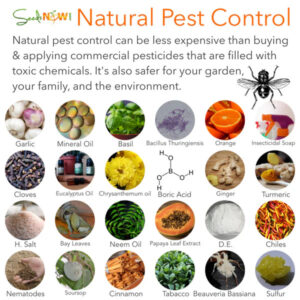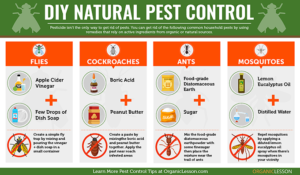Natural pest control involves using eco-friendly methods to manage garden pests without harmful chemicals. This approach includes biological, physical, and botanical solutions. Biological control involves introducing beneficial insects like ladybugs or predatory wasps to feed on harmful pests. Physical methods include barriers, such as nets or row covers, to protect plants from pests. Companion planting, where certain plants repel insects, is also effective (e.g., marigolds deter aphids). Botanical solutions involve using natural insecticides made from plant oils or extracts, like neem oil or garlic spray, which target pests without harming beneficial organisms. Natural pest control promotes biodiversity, reduces chemical dependency, and supports healthier plant and soil ecosystems in gardens.
Looking to Join Digital Marketing Institute in Meerut.

1. **Companion Planting**
Companion planting involves growing plants like marigolds and basil that repel pests or enhance plant growth. This method naturally reduces pest populations and promotes healthier plants, while minimizing the need for chemical pesticides, making it ideal for home and kitchen gardens.
2. **Beneficial Insects**
Attract beneficial insects like ladybugs and predatory wasps to control pests naturally. These insects feed on harmful pests, reducing infestations without harming the garden ecosystem. Plant flowers like dill or sunflowers to attract these helpful insects to your kitchen garden.
3. **Neem Oil Spray**
Neem oil is a natural pesticide that disrupts pests like aphids and mites while being safe for beneficial insects. Apply it as a diluted spray on plants to control pests without harming the environment. Use it weekly for effective pest control in home gardens.
4. **Garlic and Pepper Spray**
Garlic and pepper spray repels pests like aphids and caterpillars. The strong scent and spicy compounds deter insects naturally. Blend garlic and hot peppers, dilute with water, and spray on plants for an eco-friendly pest solution.
5. **Handpicking Pests**
Handpicking pests like caterpillars and beetles is an effective, chemical-free method for small gardens. Simply remove pests from plants and dispose of them. This method works well for visible, larger insects and helps maintain organic garden produce.
6. **Diatomaceous Earth**
Diatomaceous earth is a natural powder that dehydrates and kills crawling pests like slugs and ants. Sprinkle it around plants as a protective barrier. Safe for humans and plants, this method offers effective pest control without harming the environment.
7. **Row Covers and Nets**
Row covers and nets provide a physical barrier against pests like aphids and cabbage worms. Lightweight fabrics protect plants while allowing light and water through. They’re ideal for preventing damage to young seedlings and delicate crops.
8. **Soap and Water Spray**
A soap and water spray kills soft-bodied pests like aphids by breaking down their protective layers. Mix mild soap with water and apply to infested plants. This simple, cost-effective solution provides quick results and is safe for plants and beneficial insects.
9. **Eggshells or Coffee Grounds as Barriers**
Crushed eggshells and coffee grounds deter pests like slugs and ants. Scatter them around plants to create a barrier while enriching the soil as they decompose. These biodegradable materials are an eco-friendly, waste-reducing pest control method.
10. **Attracting Birds for Pest Control**
Birds like sparrows and bluebirds naturally feed on pests. Attract them with bird feeders, nesting boxes, and plants for shelter. Birds help manage pest populations and promote biodiversity, reducing the need for chemical pesticides in the garden.

Advantages of Natural Pesticides:
1. Eco-friendly and safe for the environment
2. Non-toxic to humans and pets
3. Preserves beneficial insects and wildlife
4. Supports sustainable gardening practices
5. Reduces chemical runoff in soil and water
Disadvantages of Natural Pesticides:
1. Slower to act than chemical pesticides
2. Requires frequent reapplication
3. May not work on all pests
4. Limited effectiveness for severe infestations
5. May need multiple methods for full control